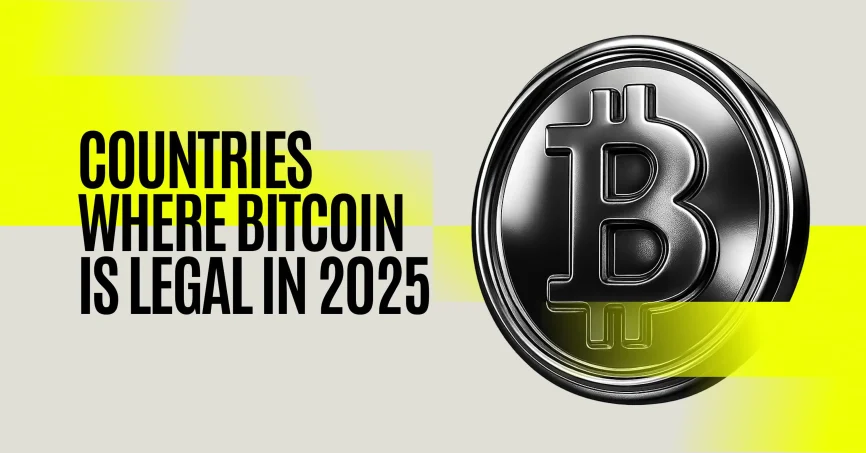Countries Where Bitcoin Is Legal in 2025

Table of contents:
Sixteen years after launch, Bitcoin is still the largest cryptocurrency by market capitalization. Unsurprisingly, major regulatory moves tend to hit Bitcoin first, and, as with the broader crypto market, its legal status varies by country.
In most jurisdictions, owning Bitcoin and using it for payments is permitted, but rules around licensing, mining, and Bitcoin ATMs differ widely.
For businesses, clarity matters. Staying compliant with AML/KYC, reporting, and security requirements reduces risk and keeps operations safe. This article walks you through where Bitcoin stands today and what to check before you start accepting it.
Countries Where Bitcoin Is Legal
Below is a concise list of crypto-friendly countries where Bitcoin is legal and businesses can accept it with compliance. The list is not exhaustive — it highlights well-known, pro-innovation markets often cited by global merchants.
- United States
- Canada
- European Union (examples: Germany, France, Italy, Netherlands, Spain)
- United Kingdom
- Japan
- Australia
- El Salvador (legal tender)
- Singapore
- Switzerland
- United Arab Emirates
- Hong Kong
- South Korea
- Brazil
- Mexico
- South Africa
These are among the most visible Bitcoin payments legal countries for 2025. However, do always check local licensing, reporting, and consumer-protection rules before you decide to accept digital currencies.
Where Is Bitcoin Restricted or Banned?
Not every country treats Bitcoin the same way. Some governments allow possession but restrict trading, payments, or advertising. Others prohibit it outright. Examples often cited as restrictive or illegal include:
- China
- Algeria
- Bangladesh
- Egypt
- Morocco
Generally, counties with a less welcoming stance on Bitcoin can be divided into two buckets:
- Restricted use: You can usually own BTC, but businesses face limits. For instance, they cannot run an exchange, advertise to consumers, or process payments without a license.
- Full ban: Trading and payments are prohibited (often enforced via banks, payment providers, or ISPs). We’ll publish a dedicated page on countries where Bitcoin is banned with full detail and sources.
Quick Reference: Legal Status of Bitcoin Worldwide (2025)
This table summarizes high-level conditions that most merchants check first. Always verify the latest rules in your target market.
| Country/Region | Legal to hold | Payments allowed for businesses | Mining | Tax treatment (typical) | ATMs/ATM | Where to buy legal |
|---|---|---|---|---|---|---|
| United States | Yes | Yes, with AML/KYC, MSB or state rules | Allowed with state power/permits | Capital gains; business income rules apply | Allowed with registration | Regulated exchanges |
| Canada | Yes | Yes with registration and AML | Allowed | Capital gains; GST/HST may apply | Allowed with compliance | Regulated platforms |
| EU (Germany, France, etc.) | Yes | Yes via licensed VASPs | Allowed | Capital gains/VAT-exempt on exchange of crypto-fiat in many states | Allowed, country-specific | EU-registered exchanges |
| United Kingdom | Yes | Yes via FCA-registered firms | Allowed | Capital gains; corporation tax for businesses | Limited, subject to FCA action | FCA-registered exchanges |
| Japan | Yes | Yes via licensed entities | Allowed | Capital gains; business income rules | Allowed with rules | Licensed exchanges |
| Australia | Yes | Yes with registration and AML | Allowed | Capital gains; business income rules | Allowed | Registered exchanges |
| El Salvador | Yes | Legal tender | Allowed | Tax incentives in place | Growing network | Chivo and licensed providers |
| Singapore | Yes | Yes via licensed firms | Allowed | Capital gains not taxed for individuals; business income taxed | Limited, regulated | MAS-regulated exchanges |
| Switzerland | Yes | Yes with VASP registration | Allowed | Capital gains often tax-favored; wealth tax may apply | Allowed | FINMA-supervised providers |
| UAE | Yes | Yes via licensed ADGM/VARA entities | Allowed | Business and VAT rules apply | Allowed with license | Licensed providers |
| Hong Kong | Yes | Yes for licensed platforms | Allowed | Profits tax can apply | Allowed with license | SFC-licensed exchanges |
| South Korea | Yes | Yes via licensed firms | Allowed | Income/capital gains rules evolving | Allowed with license | Registered exchanges |
| Brazil | Yes | Yes via licensed entities | Allowed | Income tax on gains | Allowed with rules | Central-bank supervised VASPs |
| Mexico | Yes | Yes via regulated intermediaries | Allowed | Income/capital gains | Limited | Registered exchanges |
| South Africa | Yes | Yes via licensed providers | Allowed | Income/capital gains rules | Allowed with license | Licensed exchanges |
Why Legal Status Matters for Businesses
Clear rules turn crypto from a risk into an operational capability. When you work with a licensed, audited payment provider, core controls are built in: KYB/AML screening, risk scoring, reconciled accounting reports, security standards such as ISO/IEC 27001, and independent third-party audits.
The result is straightforward: safer payments, fewer disputes, cleaner reviews with finance and compliance, and an easier path through due diligence.
The takeaway for 2025
Bitcoin is legal in most markets, but not universally cleared for business payments. If you’re considering accepting Bitcoin, focus on licensing, AML/KYC, reporting, custody choices, and supported assets. That’ll let you reach customers and stay compliant in 2025.
FAQ: Bitcoin Legality by Country
Yes. You can hold and use BTC. Businesses follow AML/KYC and money-service rules and keep records for tax.
El Salvador made BTC legal tender. Japan, the EU, the US, Canada, Switzerland, Singapore, Australia, and others allow legal use under licensing and AML.
Examples include China, Algeria, Egypt, Morocco, and Bangladesh. We will publish a full page on countries where Bitcoin is banned.
Yes, in most countries it’s legal when processed through a compliant, licensed provider that applies AML/KYC and provides audit-ready statements.
When they use licensed providers with KYB/AML, risk scoring, ISO-27001-level security, and clear accounting docs. That keeps operations safe and audit-ready.
Disclaimer.
CoinsPaid operates under Estonian licensing and offers services only in territories where such services are lawful. This article is for general information. It is not legal, tax, or accounting advice. Regulations change and vary by country and region. Speak with a qualified lawyer or advisor about your specific situation before you start accepting or using crypto.
